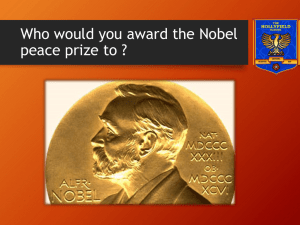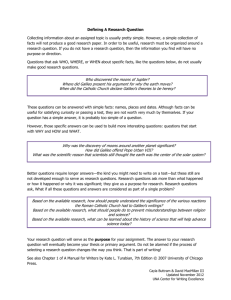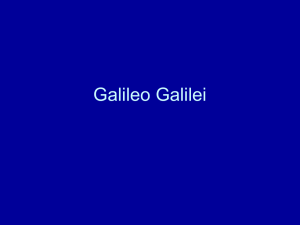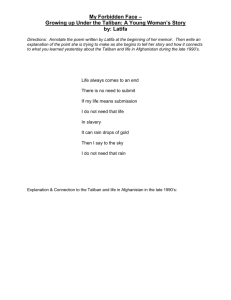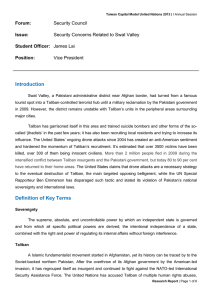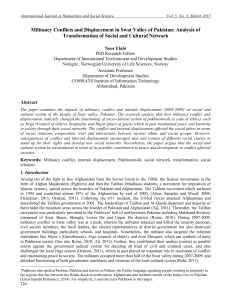Literature suppressed on religious grounds
advertisement
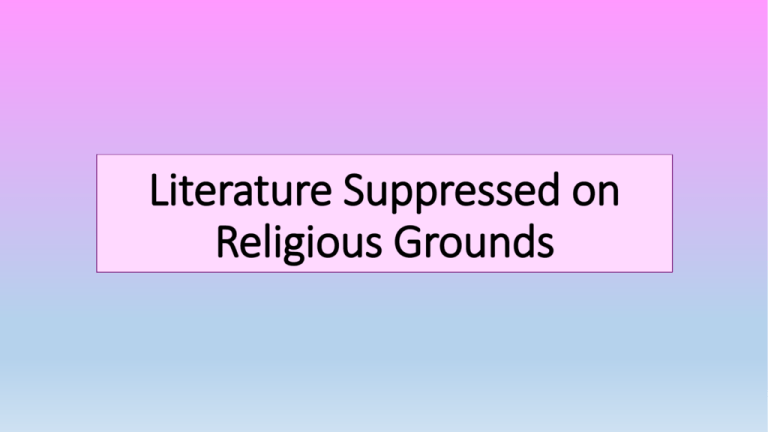
Literature Suppressed on Religious Grounds Galileo Galilei February 15, 1564 - January 8, 1642 Dialogue concerning the two chief world systems Nicolaus Copernicus (building on work by Aristarchus of Samos ~ 200 B.C.) 16th century On the Revolutions of the Heavenly Bodies Galileo Galilei Dialogue concerning the two chief world systems Dialogue between: Salviati - representing Galileo Sagredo - an intelligent layman Simplicio – an Aristotelian Galileo Galilei Dialogue concerning the two chief world systems • Summoned before the Inquisition • Charged with teaching and defending the Copernican doctrine that holds that the Sun is at the center of the universe and that the earth moves (a doctrine that had been deemed heretical in 1616) • Ordered to kneel while his sentence was read • It was declared that he was “vehemently suspect of heresy”. • Galileo was made to recite and sign a formal abjuration Galileo Galilei Dialogue concerning the two chief world systems “I have been judged vehemently suspect of heresy, that is, of having held and believed that the sun in the centre of the universe and immoveable, and that the earth is not at the center of same, and that it does move. Wishing however, to remove from the minds of your Eminences and all faithful Christians this vehement suspicion reasonably conceived against me, I abjure with a sincere heart and unfeigned faith, I curse and detest the said errors and heresies, and generally all and every error, heresy, and sect contrary to the Holy Catholic Church.” Galileo Galilei Dialogue concerning the two chief world systems • Sentenced to house arrest • Remained there the rest of his life Ahmed Salman Rushdie (a.k.a. Sir Salman Rushdie) (born June 19, 1947, Bombay [now Mumbai], India The Satanic Verses • Some adventures in the book depict a character modeled on the Prophet Muhammad • Ayatollah Ruhollah Khomeini of Iran condemned the book and issued a fatwā against Rushdie • Bounty offered to anyone who would execute Rushdie Malala Yousafzai (born July 12, 1997, Mingora, Swat Valley, Pakistan) spoke out publicly against the Taliban’s prohibition on the education of girls • When 11 years old gave speech at local press club: “How Dare the Taliban Take Away My Basic Right to Education?” • speech was publicized throughout Pakistan • Taliban shut down all girls’ schools in Swat and blew up more than 100 of them Malala Yousafzai (born July 12, 1997, Mingora, Swat Valley, Pakistan) spoke out publicly against the Taliban’s prohibition on the education of girls • Became a blogger on BBC under an alias • Made television appearances • awarded Pakistan’s first National Youth Peace Prize in 2011 • Shot in the head by a Taliban gunman while she was en route home from school in 2012 Malala Yousafzai (born July 12, 1997, Mingora, Swat Valley, Pakistan) spoke out publicly against the Taliban’s prohibition on the education of girls • Taken to Britain for treatment • Survived the assassination attempt • Awarded United Nations Human Rights Prize in 2013 • Awarded the Nobel Peace Prize (jointly with Kailash Satyarthi of India) Hate speech? Black’s Law Dictionary (17th ed.) “Speech that carries no meaning other than the expression of hatred for some group, such as a particular race, esp. in circumstances where the communication is likely to provoke violence.” Fighting words? Black’s Law Dictionary (17th ed.) 1. Inflammatory speech that might not be protected by the First Amendment’s freespeech guarantee because it might incite a violent response. 2. Inflammatory speech that is pleadable in mitigation – but not in defense – of a suit for assault Nigeria Counts 100 Deaths Over Danish Caricatures By LYDIA POLGREEN The violence linked to anger over cartoons depicting the Prophet Muhammad has reignited old ethnic and political tensions between Nigeria's Muslims and Christians. (New York Times February 24, 2006) What do you think?
